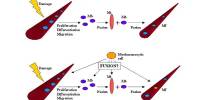Researchers at the Moffitt Cancer Center have created a new reagent that improves medication production precision. This novel approach, described in Nature Communications, presents a new sulfur fluoride exchange (SuFEx) reagent that enables the highly regulated manufacture of important sulfur-based compounds such as sulfinamides, sulfonimidamides, and sulfoximines.
These molecules are critical in the pharmaceutical business, but they have been difficult to manufacture with the necessary stereochemical precision. The novel reagent t-BuSF employs strain-release reactivity to achieve previously impossible levels of efficiency and selectivity, opening the door to more successful drug development and broader medical research applications.
Sulfur-based compounds, including those developed using the new methods, are known to have favorable physiochemical properties that make them ideal candidates for drug development.
Justin M. Lopchuk
“Sulfur-based compounds, including those developed using the new methods, are known to have favorable physiochemical properties that make them ideal candidates for drug development,” said Justin M. Lopchuk, Ph.D., lead author and associate member of the Drug Discovery Department at Moffitt. “The ability to synthesize these compounds rapidly and stereochemical control open new possibilities for designing targeted therapies that combat cancer cells more effectively while minimizing side effects.”
This method involves rapidly testing thousands of compounds against a target to identify potential drug candidates. Innovations in HTS, such as miniaturized assays and advanced detection technologies, are improving its efficiency and effectiveness.

Using the t-BuSF reagent’s unusual features, researchers were able to explore hitherto inaccessible chemical space within the sulfur family, particularly in the S(IV) and S(VI) oxidation states. This progress has led in the discovery of over 70 new chemical compounds, many of which have immediate applications in medicinal chemistry and the development of novel pharmacological drugs.
Creating broad and high-quality chemical libraries, which include both natural products and synthetic molecules, improves the chances of discovering new therapeutic candidates. Chemical synthesis and combinatorial chemistry advancements help to build more comprehensive libraries.
Lopchuk adds that this research has already been used to significantly improve the scalable synthesis of DFV890, an investigational compound from Novartis currently in clinical trials at Moffitt and other locations for myeloid diseases.
















